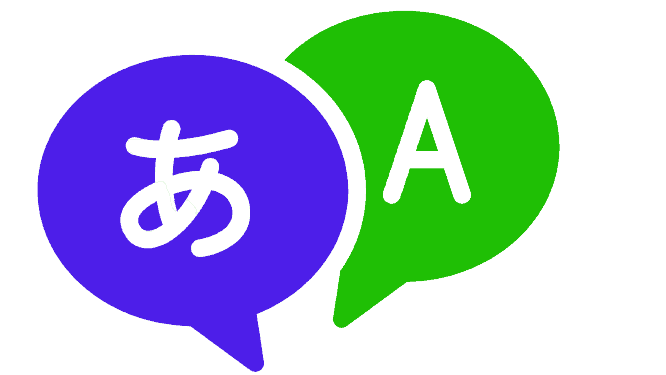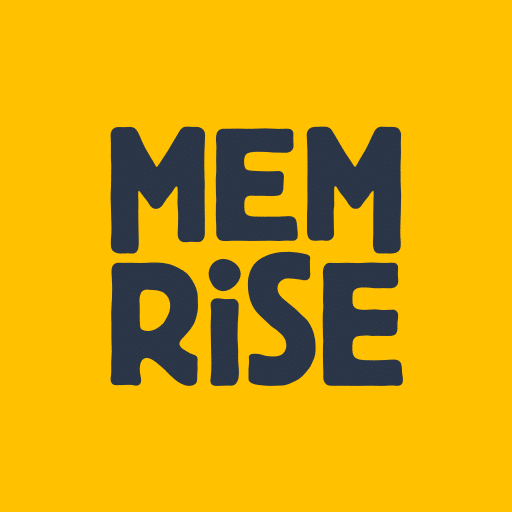LingQ vs Memrise: Embarking on a journey to learn a new language? 🗣️ Meet LingQ and Memrise, the keys to linguistic excellence! 🚀 As we explore each platform’s distinctive capabilities, learn the subtle differences between them to help you make a selection that will enable you to have the conversations of your dreams. Are you prepared to choose your language partner? Together, let’s decode the language of learning! 🌐📚
LingQ vs Memrise Compared

- Number of Languages: 45
- Free Trial (or free version): Yes
- Speech Recognition: Yes
- Avg. Lesson Length: 5 Minutes
- Pricing: Starts from $12.99
- Money Back Guarantee: 30 Days
- Grammar Instruction: Better
- Live classes: Yes
- Progress Tracking: Yes
- Tests/Quizzes: Yes
LingQ Overview
LingQ is a dynamic language learning platform that puts context at the heart of learning. It promotes natural language learning with several reading and listening exercises. Users can lose themselves in a variety of real material, such as podcasts, videos, and articles in their native tongue.
With it’s unique method, students can pick up vocabulary in context, assisting in their comprehension of words and expressions as they are used in everyday scenarios. The platform also offers a built-in dictionary and tools for creating personalized vocabulary lists.
With a focus on exposure and comprehension rather than rote memorization, LingQ equips students with the tools they need to build strong language abilities and the confidence to communicate clearly.
My LingQ Experience
My experience with the LingQ app and website has been truly enriching. I was pleasantly impressed by the similarly impressive user experience that provided simple and easy navigation after choosing German as my target language.
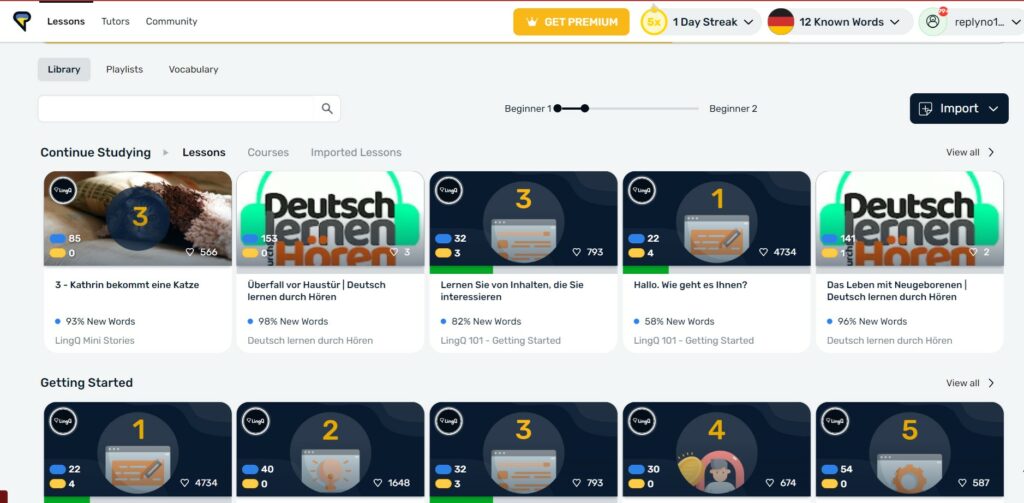
Similar to my prior experience with Memrise, LingQ emphasizes vocabulary heavily. The option to learn uncommon German terms and make customized “LingQs” gave my learning process a more individualized feel.
The use of German terms in common phrases is one aspect that stands out. This not only makes it easier to comprehend the context, but it also gives you a chance to hear the words that are being used. My success was enhanced by the platform’s gamification feature, which awarded me with points.
What are the benefits of LingQ? The “listen and read” questions completely changed how I would pronounce words. A multitude of courses were also available to free users, which was a nice surprise, and the lack of advertisements improved the learning environment. The platform’s community feature was further strengthened with the inclusion of discussion forums.
The “challenge” option stood out as a special feature that drew my attention. This feature gave users a specific objective to strive towards, whether it was mastering 1000 words or learning a language constantly for 30 or 90 days. Long-form audio information from native speakers was also included, which improved my learning experience even further.

Grammar and vocabulary classes were given their own lessons to enable a thorough learning process. My LingQ experience was effective, participatory, and enjoyable because to this mix of elements. It has surely given me a well-rounded language learning experience that keeps me motivated and moving forward with its user-friendly UI, useful apps, gamification, and varied study modules.
Drawbacks
While LingQ offers a host of positive features, there are a couple of drawbacks worth mentioning. The platform’s somewhat diminished emphasis on offering in-depth material is one obvious disadvantage. Some students could be left desiring more thorough lessons or explanations of certain linguistic concepts.
Another limitation I encountered was the restriction on the number of words you can save as “LingQs” for free users, capped at 20 words. This may be quite restrictive, particularly for individuals hoping to significantly increase their vocabulary without subscribing to a premium membership. Users who prefer in-depth learning and need a greater vocabulary storage capacity should take these restrictions into account.
- Authentic Content Immersion: LingQ’s focus on real-world articles, podcasts, and videos helps learners understand language in its natural context, enhancing comprehension and communication skills.
- Vocabulary in Context: By learning words within sentences and paragraphs, LingQ aids in grasping nuances and usage, leading to more effective vocabulary acquisition.
- Personalized Vocabulary Lists: The platform allows learners to create and review their own vocabulary lists, tailoring their learning experience to their preferences and needs.
- Adaptive Algorithms: LingQ’s algorithms adjust the difficulty of content based on your progress, gradually challenging you as you improve, ensuring consistent growth.
- Community Interaction: LingQ offers a community forum where learners can connect, ask questions, and receive feedback from native speakers and fellow learners.
- Multi-Language Options: With a diverse array of 45 languages available, LingQ accommodates learners interested in less commonly taught languages as well as popular ones.
- Flexibility and Autonomy: LingQ’s content-driven approach gives learners the freedom to choose materials that interest them, making the learning journey more engaging and self-directed.
- Learning Curve: LingQ’s interface and immersion-based approach might be overwhelming for absolute beginners, requiring some time to adapt.
- Limited Structured Learning: While LingQ emphasizes content immersion, it might lack structured courses, which some learners prefer for a guided learning path.
- Less Emphasis on Speaking: While LingQ aids in reading and listening skills, it might not provide as many opportunities for active speaking practice compared to some other platforms.
Memrise Overview
Memrise is a popular language learning app that blends technology with gamification to create an engaging learning experience. It provides a selection of organized courses in many different languages. By maximizing study intervals, Memrise’s spaced repetition methods help with vocabulary retention.
The software uses interactive challenges and mnemonic elements to make learning engaging and remember. Users can learn in manageable, bite-sized chunks by taking part in brief lectures.
Features for monitoring progress give a clear picture of development. Memrise is a desirable alternative for people who want a gamified approach to language learning because of its user-friendly interface and aesthetically pleasing design, which improve the whole learning journey.
My Memrise Experience
My journey with the Memrise app and website has been nothing short of impressive. The user-friendly online UI welcomed me with a tidy and clear layout right away, which gave my experience learning a new language a good start.
I decided to take Memrise French course (you can change the language anytime), and I was pleasantly delighted by the first display of words like “hello” together with images and music. The use of multimedia not only kept me interested but also improved my comprehension of the pronunciation and context.
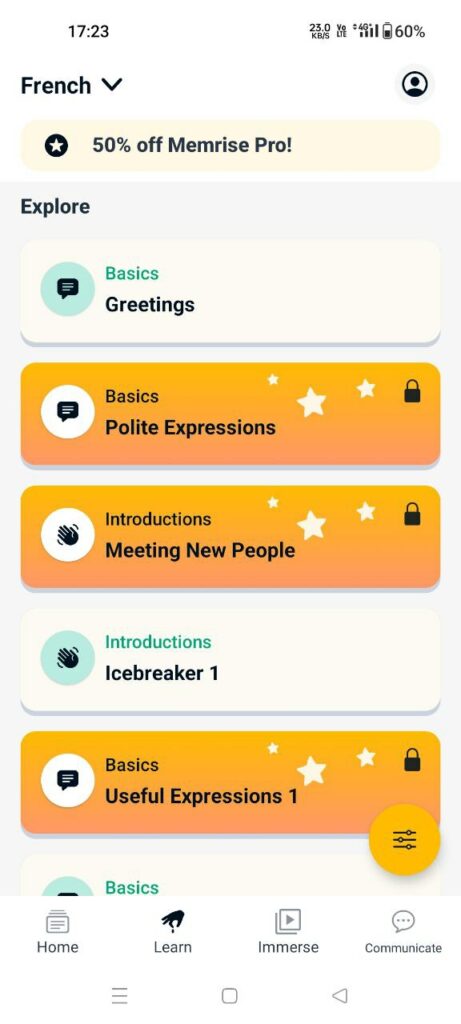
The availability of audio recordings made by various people stood out as a distinctive feature. Each question was carefully translated and accompanied by a GIF or short video of a native speaker pronouncing the French phrase. My learning process now has an interactive component.
Despite utilizing the free tier, I was happy to find a ton of fundamental information. However, the paid plan offers an enticing feature – access to 30,000 native speaker videos. I could choose from curated classes for several languages in the courses area, which was a gold mine. I really liked having the option to choose courses in Arts & Literature, History/Geography, Trivia, Entertainment, or Science depending on my interests and requirements.

My experience was improved in part by Memrise’s groups function, which makes it easier to interact with other language learners. As a result, I had a feeling of belonging, which allowed me to interact and connect with others who shared my goals for my language-learning journey.
My language study has been both fun and successful because to Memrise’s user-friendly design, multimedia learning tools, broad material, and social aspects. My experience was greatly enhanced by the variety of courses and the opportunity to communicate with native speakers via videos, which made sure that my language learning path remained fun and interesting.
Drawbacks
What is the disadvantage of Memrise? While this language learning app have many benefits, there are a few downsides that should be mentioned as well. The inclusion of advertisements for free users is one obvious downside. These interruptions can sometimes disrupt the flow of learning and create a less immersive experience.
I also found that there wasn’t much attention placed on pronunciation. Although the application offers videos of native speakers and audio recordings, there may be greater emphasis on teaching users how to pronounce words correctly. This can be a chance lost for students hoping to improve their spoken language skills.
Additionally, a potential limitation lies in the lack of in-depth materials in the free-tier. Even though the app provides a variety of courses and information, some users may feel that particular themes or language-related features aren’t covered as thoroughly as they would want.
- Gamified Learning: Memrise’s interactive challenges, mnemonic techniques, and spaced repetition create an engaging and fun learning experience that motivates consistent practice.
- Structured Courses: The platform offers well-organized courses that guide learners through a systematic progression, making it ideal for beginners and those who prefer a clear learning path.
- Spaced Repetition System: Memrise’s system optimizes the timing of word reviews, ensuring effective retention and making vocabulary learning more efficient.
- Audio Pronunciation: With audio clips accompanying vocabulary items, Memrise helps learners practice pronunciation and improve listening skills alongside vocabulary acquisition.
- Visual Learning: The use of visuals and associations in Memrise’s mnemonic techniques aids memory recall, making it easier to retain and recall new vocabulary.
- Mobile App: Memrise’s user-friendly mobile app is convenient for on-the-go learning, allowing learners to practice and study even in short pockets of time.
- Community Features: While not the primary focus, Memrise provides a community section where learners can interact, share experiences, and ask questions.
- Less Focus on Context: Memrise’s gamified approach might provide less context-rich immersion compared to platforms like LingQ, which emphasize content-based learning.
- Limited Content Choice: While Memrise offers structured courses, the content might not be as diverse or authentic as some other platforms that prioritize real-world materials.
- Less Depth in Advanced Topics: While beneficial for beginners and intermediates, Memrise’s content might not delve as deeply into advanced language nuances or specialized topics
LingQ & Memrise Detailed Comparison
User Interface and Experience (UI/UX)
As a language enthusiast who’s explored both LingQ and Memrise, I can share my experience with their user interfaces. I first thought the LingQ UI was simple yet a little complicated. It took some time to get used to the navigation, and the initial learning curve was steeper. Memrise, on the other hand, came off as warm and welcoming right away. Its user-friendly layout made it simple to get right into classes and tasks without any hassle.

LingQ gave users a unique opportunity to learn via immersion. I was effectively engaged in real-world information because to the platform’s focus on reading and listening in the target language. But at first, the sheer number of choices was a little daunting.
Memrise, in contrast, provided a gamified learning experience that resembled playing a game. The interactive quizzes and mnemonic elements were enjoyable and helpful in aiding language retention. The quick lessons were useful, particularly for those with hectic schedules.
Both platforms provide unique experiences. While Memrise caters to people who thrive on gamification and organized learning, LingQ is perfect for those who prefer a content-driven approach.
Language Course Selection
LingQ’s vast language selections, which include 45 different languages, really amazed me. I was able to discover both popular and lesser-known languages because to the wide variety.
I liked how LingQ placed a strong focus on authentic content by offering articles and other resources that accurately represented language usage in daily life. It was easy to fit studying into my hectic schedule, thanks to the average course time of roughly 5 minutes each topic component.
How many languages does Memrise offer? It only offer 23 languages. Although there was a smaller variety, the organized courses were well-designed and tailored to both beginning and intermediate students. It took a little bit more time to complete each session since the typical lesson, which was roughly 15 minutes long, was a little bit longer than LingQ’s.
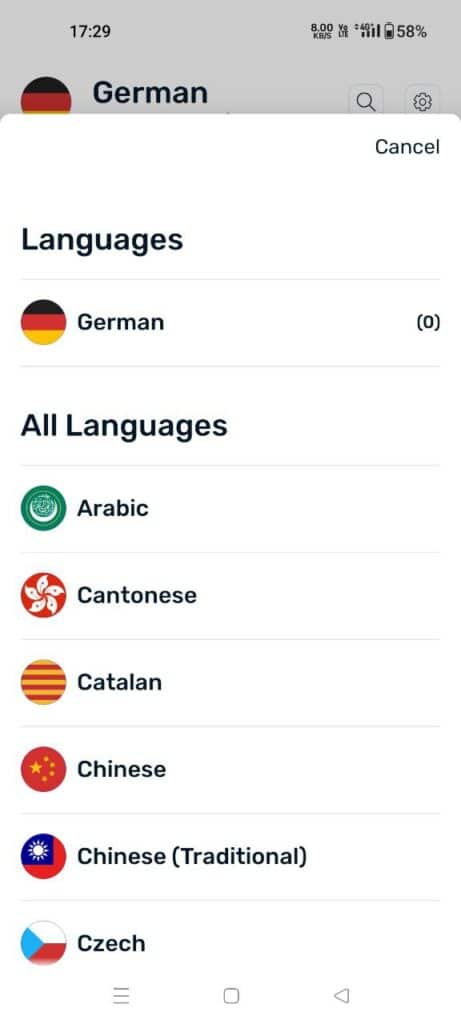
I found that this language app’s focus on reading and listening in the target language was quite helpful. I was able to learn more about a variety of subjects while honing my language abilities, thanks to the platform’s extensive collection of real information.
It was super-easy to concentrate on terms that were important to me because to the ability to make customized vocabulary lists from the information I interacted with. My engagement in the language and culture was genuine, thanks to this method, which also made the learning process fun.
On the other hand, Memrise’s organized courses suited my need for a logical progression through the learning process. The use of mnemonic devices, interactive challenges, and spaced repetition methods in a gamified manner proved interesting and productive. You can also make your own course & publish on Memrise.
Even though the variety may not be as large as LingQ’s, I discovered that the accessible courses were well-organized and suited to students of all ability levels. It was a great way to build a solid foundation in the language I was learning.
LingQ’s portfolio of language courses thrives on its variety and immersion-focused material, making it the perfect choice for individuals who desire a genuine experience. For learners who like a more organized learning environment, Memrise’s structured courses and gamified methodology are ideal. Your learning style and objectives will determine which platform is best for you. Both provide worthwhile language learning opportunities.
Learning Methods and Techniques
The focus of LingQ’s methodology is on context and involvement. They really made reading and listening a priority, in my opinion. I was able to learn linguistic subtleties and expressions in actual circumstances by exposing myself to real-world stuff.
My comprehension abilities improved because to the platform’s novel approach of teaching vocabulary inside phrases and paragraphs. I had the impression that I was studying the language in its true context, which increased my comfort level while speaking it.
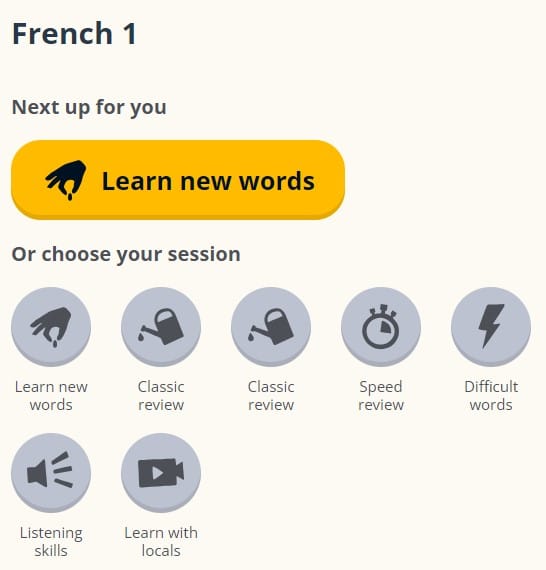
Memrise, on the other hand, concentrates on a gamified strategy. The interactive challenges and mnemonic devices make learning new words fun and memorable. My memory was strengthened by the spaced repetition technique, which made sure I reviewed terms at the right intervals.
A clear learning route was offered by the organized courses, which helped students lay a strong foundation. Learning became more entertaining and motivating because to the interactive components, which converted it into a game.
Gamification and Engagement
Which is better LingQ or Memrise when it comes to interactive engagement? While it doesn’t significantly use gamification components, it focuses mostly on content immersion, which encourages users to explore real-world articles and podcasts.
With this strategy, you get fully immersed in the language and culture, which is both instructive and fascinating. Your interest in the subjects you’re reading about or listening to arises from your desire to fully comprehend and benefit from them.
Memrise focuses a big emphasis on gamification to keep students interested. Learning is made fun by using mnemonic tools and interactive challenges. The visual components, like the garden that expands as you go, give you a feeling of success.
Leaderboards and streaks, among other competitive features, provide a supportive and energizing community. These components help to keep practice constant and make learning enjoyable.

While Memrise uses gamification to make learning engaging and engaging, LingQ’s engagement comes from true content immersion. You can pick the strategy that best suits you, whether you want a more content-driven approach or the rewards and difficulties of a gamified journey.
Pronunciation Practice
LingQ’s content immersion methodology allows for pronunciation practice. My pronunciation organically improved by listening to real speakers in genuine situations. I was able to hear accurate intonation, rhythm, and pronunciation variances, thanks to the platform’s audio material. Although there aren’t any particular workouts for pronunciation, being exposed to actual speech patterns helped me to improve my pronunciation.
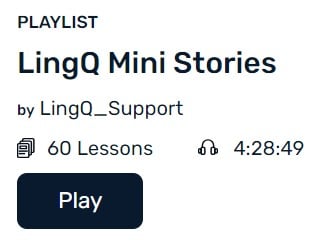
Memrise uses audio samples and interactive challenges to teach pronunciation in a more explicit manner. The platform often asks you to repeat words or phrases, assisting you in concentrating on proper pronunciation. This active participation in spoken language contributes to the development of a more solid pronunciation base.
It provides more straightforward and engaging activities, whereas LingQ’s method incorporates pronunciation practice throughout its immersive material. Memrise could be better if perfect pronunciation is your primary objective. However, LingQ may also be useful if you choose a comprehensive strategy for language learning that exposes you to natural pronunciation.
Progress Tracking and Analytics
LingQ provides progress tracking through its statistics and goals system. I found it helpful to see how many words I’d learned and how many lessons I’d completed. With the help of the goal-setting tool, I was able to create goals for my daily study and maintain consistency. The progress monitoring, however, looked to be very simplistic, emphasizing word lists and course completion above deeper insights.
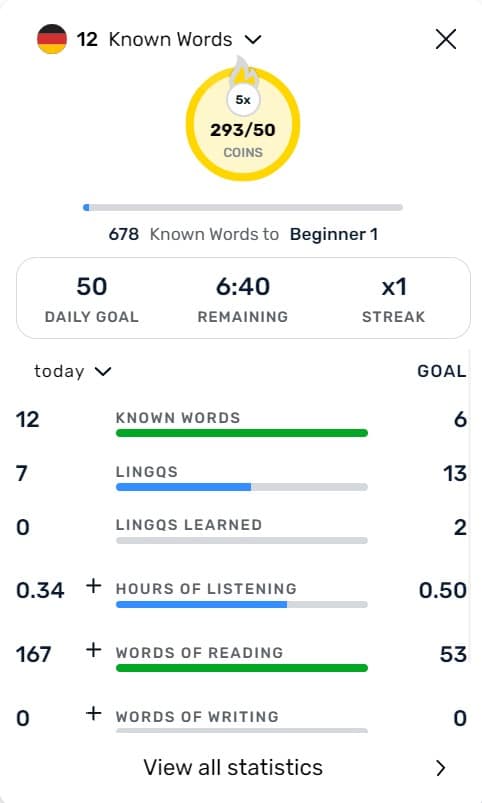
Memrise provides a more in-depth method of analytics and progress monitoring. Your streaks, daily objectives, and study time are all tracked. It also shows you how many words you’ve learnt, how well you’ve kept them, and even compares your development to that of other students. This data-driven methodology is motivational and enables you to adjust your learning plan in accordance with performance. You can reset your progress on Memrise anytime & start from scratch.
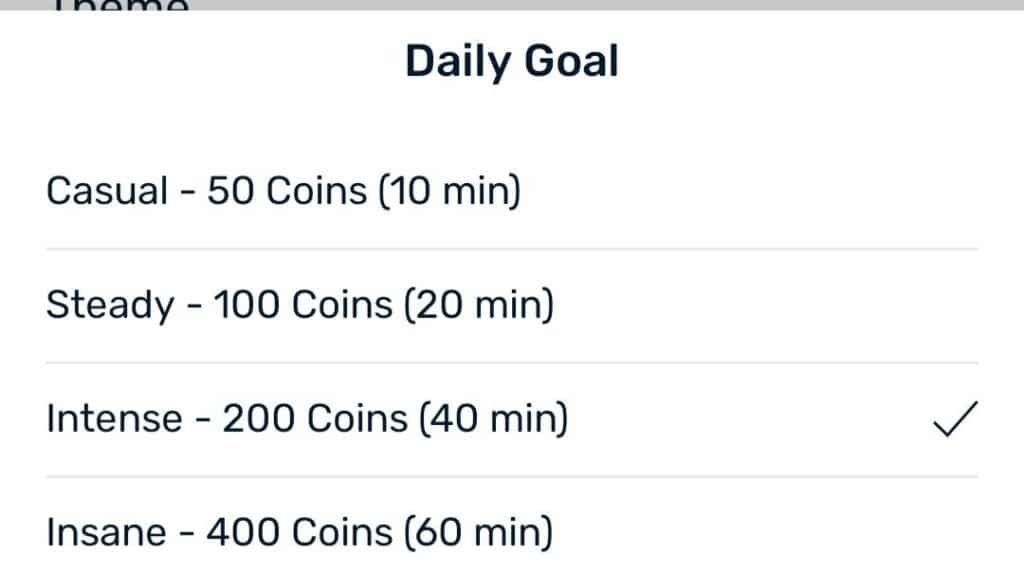
The LingQ progress monitoring system is simpler, emphasizing vocabulary and course completion. With insights on learning patterns, vocabulary retention, and even comparisons with other learners, Memrise provides a data-rich environment. The platform that best suits your monitoring preferences depends on whether you like a straightforward or analytical approach.
Mobile App Features
LingQ’s mobile app provides access to its extensive library of content, making it convenient to immerse yourself in reading and listening on the go. The ability to build and review vocabulary lists on your mobile device improves your learning experience, even if the app’s interface could take some getting used to. However, the app’s interface can feel a bit complicated initially.
The mobile app for Memrise is straightforward to use and attractive on the eye, making it perfect for fast and simple navigation. The gamified methodology of the software is perfectly adapted for mobile platforms, and interactive challenges and mnemonic devices make learning engaging even in brief sessions. Instant feedback on pronunciation exercises and the spaced repetition method are both useful components that support efficient learning.
The LingQ mobile app provides individualized vocabulary lists and content immersion, although the user interface can need some tweaking. The Memrise app offers a more user-friendly experience, particularly for organized courses and gamified learning.
Vocabulary Building Tools
LingQ’s approach to content immersion include vocabulary development. You can quickly click on unfamiliar terms to get their definitions and add them to your own vocabulary list while reading and listening to real content. The context-rich learning environment helps grasp real word use. This approach enables a more natural and contextual approach to vocabulary learning.
In contrast, Memrise’s organized courses include specific vocabulary-building tools. The use of mnemonic tools and a strategy of spaced repetition helps people remember new words more easily. The app reminds you to review words at the right times to help them stay in your memory. The repetitions and challenges that have been gamified make learning vocabulary more interesting.
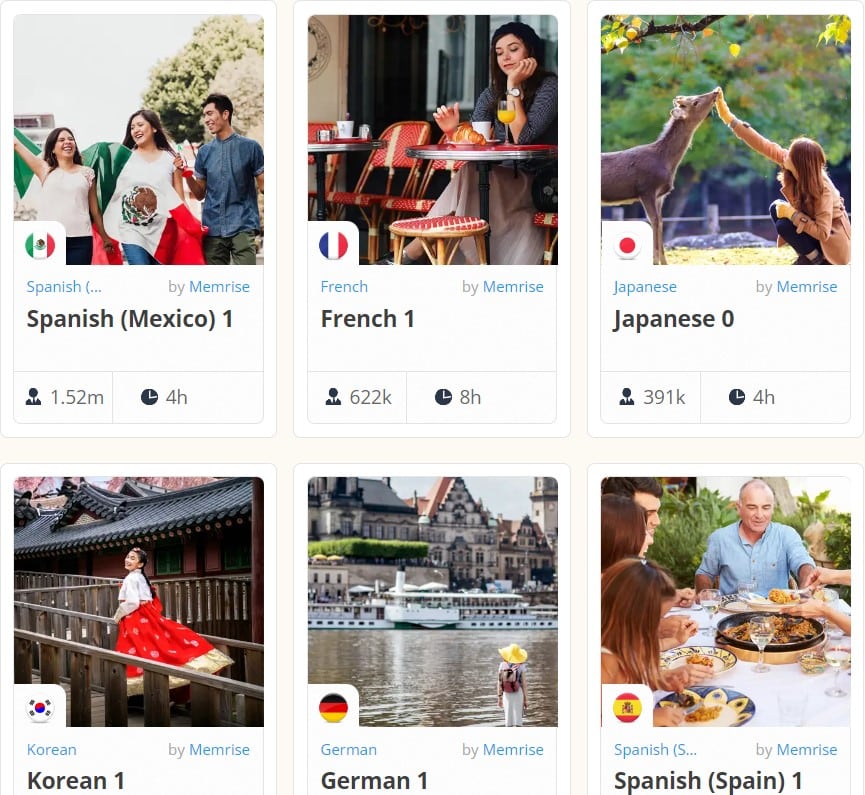
So, what is better Memrise or LingQ for vocabulary developement? Memrise uses mnemonics and spaced repetition to teach vocabulary, whereas LingQ integrates it into its immersive content. Which language platform best matches your vocabulary development preferences will depend on whether you like to study terms in context or via explicit methods.
Offline Learning Options
Does LingQ work offline? The platform offers limited offline access to its content. While lessons and vocabulary lists may be downloaded for offline usage, the main component of the learning process still requires an online connection. This implies that although certain items may be prepared for offline consumption, complete immersion might not be feasible without an online connection. But, offline feature in LingQ is available only for paid subscribers.

On the other side, Memrise features a stronger offline learning function. For circumstances when you may not have internet connection, the app lets you download full courses for offline usage. This means that even when you’re on the road or in an area with poor internet, you can still use the app to learn new things, practice your vocabulary, and interact. Please note that, you have to use Memrise app to access offline feature. Website doesn’t have it.
By enabling you to download full courses for studying without an internet connection, Memrise provides a more robust offline learning alternative. While LingQ does provide some offline access, its immersive content is primarily dependent on internet connection. Your decision would depend on how often you needed or wanted to study offline.
Personalized Learning and Adaptive Algorithms
LingQ’s personalized learning approach is centered around content choice. The ability to choose the information that interests you might make studying more interesting. The platform’s adaptive algorithms keep track of the words you’re picking up and change the degree of difficulty in accordance with your development. This enables you to progressively take on more difficult content as your language abilities improve.
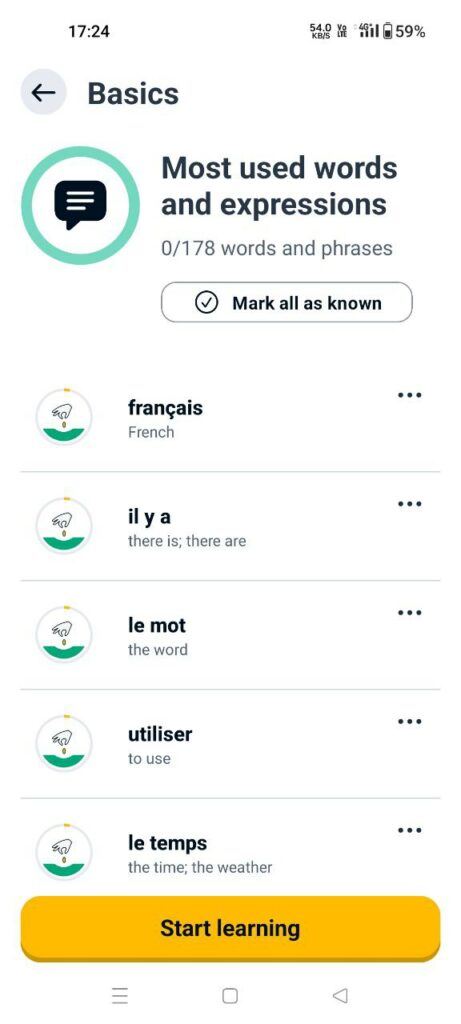
Memrise’s spaced repetition technique and adaptive algorithms power its individualized learning. The program optimizes your retention by adjusting the time of word evaluations depending on how well you recall them. Additionally, the organized courses ensure that you are building on what you have learned as they lead you through subject that is increasingly more challenging.
Although in somewhat different ways, both language learning apps provide individualized learning and adaptive algorithms. In contrast to Memrise’s spaced repetition technique and planned courses, LingQ’s approach relies on material selection and progressive difficulty modification. You can pick the platform that best fits your learning style depending on whether you want systematic, algorithm-based personalisation or content-driven personalization.
Translations
The translation method used by LingQ is rich in context. When reading or listening to information, you can click on any words or phrases you don’t understand to obtain a translation. Understanding words in the context of sentences and paragraphs is the main focus. This helps the brain in picking up on the subtleties and natural word use.
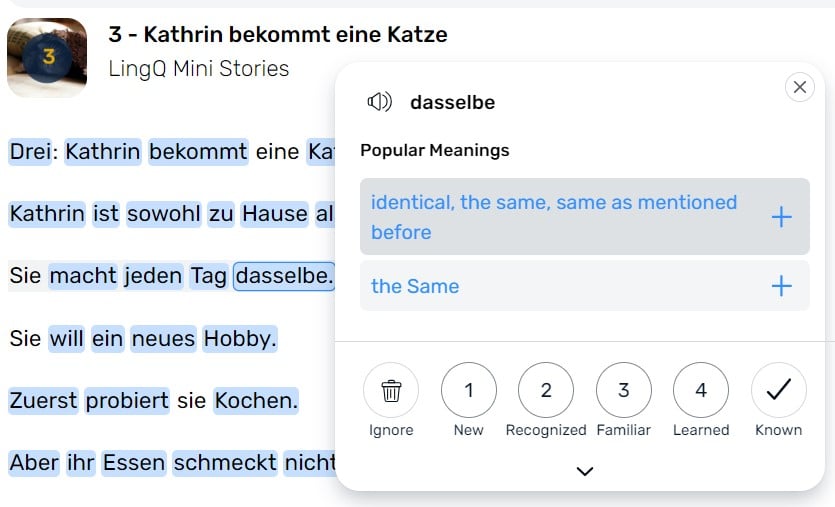
Translations are also available on Memrise, often with audio pronunciations. Although learning vocabulary via associations and mnemonics is the primary goal, translations provide a convenient way to look up a word’s definition. Instead of straight translations, the site encourages you to recall words via images and interactions.
Both LingQ and Memrise provide translation capabilities, although they do it in different ways. While Memrise offers translations along with mnemonic instruments, LingQ incorporates translations into immersive material to improve understanding.
Pricing
| Plan | LingQ | Memrise |
|---|---|---|
| 1 Month | $12.99 (45 Languages) | $14.99 (23 Languages) |
| 6 Months | $71.94 (45 Languages) | – |
| 12 Months | $107.88 (45 Languages) | $89.99 (23 Languages) |
| 24 Months | $191.76 (45 Languages) | – |
| Lifetime | – | $199.99 (23 Languages) |
Both LingQ and Memrise provide a variety of subscription plans to fit diverse needs and schedules. For individuals looking for lifelong access, Memrise’s lifetime subscription offers the option of a one-time payment. It provides a variety of options with the possibility for cost savings with longer commitments.
How much does Memrise app cost? You can taste their premium access for as low as $14.99 for 1 month. If you are committed, you can consider the lifetime plan at $199.99. All plans comes with a money-back guarantee if you cancel it.
The cost of both platforms is competitive in the market for language learning when taking affordability into account. Your return on investment (ROI) largely depends on how effectively you utilize the tools and resources provided by each platform.
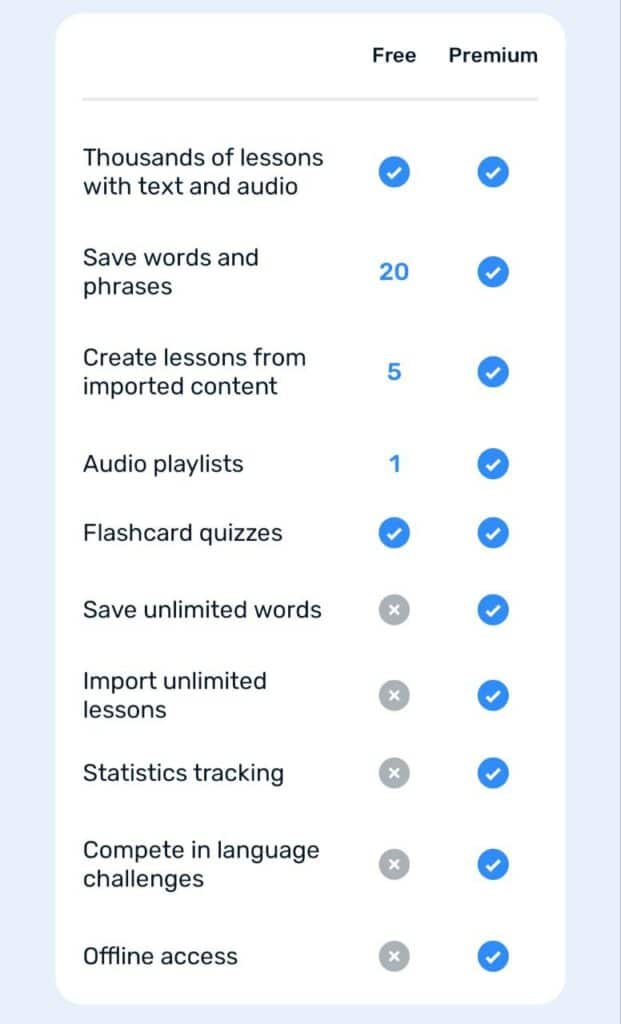
While LingQ doesn’t have a lifetime plan like Memrise, its premium plus plans offer live classes, enhancing the value proposition for those interested in interactive learning. Needless to say, you are free to cancel LingQ plans as your wish & get a refund.
When selecting on a platform, it’s important to analyze not just the price but also the features, learning techniques, and other perks available. You can decide on the best commitment for your language learning journey by carefully considering how the platforms fit with your learning style, objectives, and budget.
What are the key differences between these apps?
LingQ places a strong emphasis on authentic content from real-world sources like news articles, podcasts, and blogs. By putting students in the language’s everyday usage, this content-rich method helps them understand idioms, cultural allusions, and colloquial phrases. It is comparable to studying a language in its cultural context.
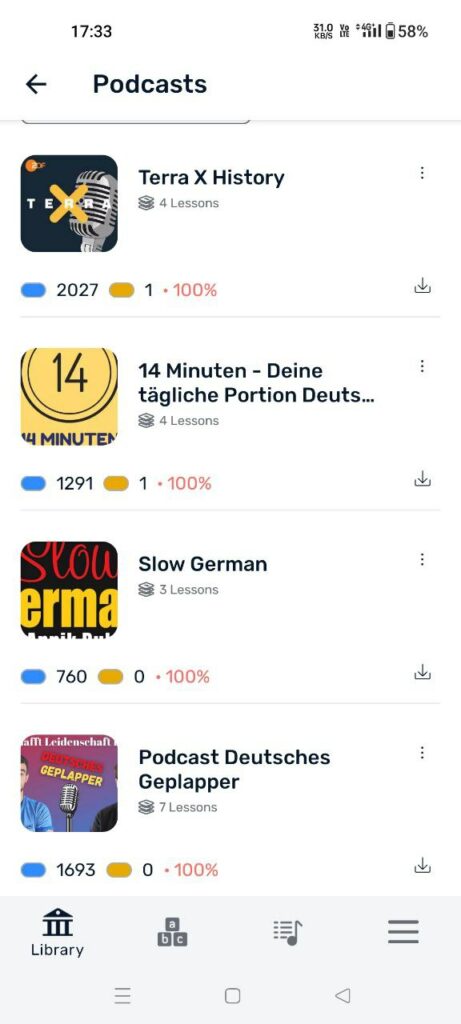
Memrise excels in providing learners with planned courses that lead them along a set route. This might be especially helpful for novices who might feel overwhelmed by the volume of available learning resources. A sturdy foundation is created and a continuous advancement is ensured by the planned method.
Additionally, LingQ provides a community feature where users may interact with other language lovers and native speakers. This encourages a feeling of community and offers chances for practice and criticism apart from the app’s content. Although Memrise includes a community area, it is not as extensively featured.
LingQ’s basic UI can require some getting accustomed to, particularly for those who are unfamiliar with language learning systems. Memrise, in comparison, has an aesthetically beautiful and user-friendly design that is there from the beginning, making it more open to a larger audience.
These extra variations emphasize the distinctive tastes that each app adds to the language learning process. Depending on your preferences, goals, and learning style, one of these platforms might align more closely with your language learning journey.
LingQ is best for whom & how?
The learners who value context-driven language learning and like to learn by immersing themselves in real-world material should use LingQ. If you’re someone who enjoys reading articles, listening to podcasts, and watching videos in your target language, it’s approach can be incredibly effective.
Intermediate to advanced language learners who have a fundamental grasp of the language’s structure and grammar will find LingQ to be very helpful. You can better understand idiomatic expressions, cultural allusions, and other linguistic subtleties by using words and phrases in authentic circumstances. This approach often results in talks that seem more natural and a greater understanding of language use.
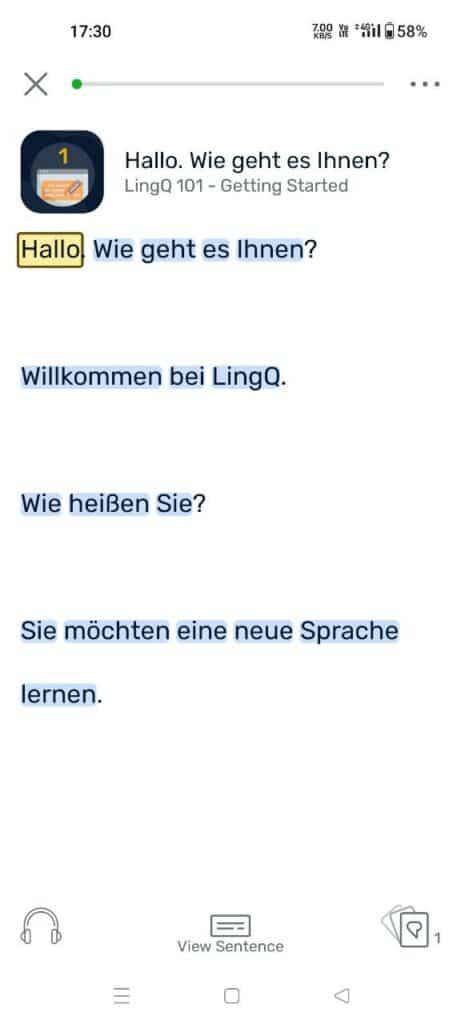
Moreover, LingQ’s personalized vocabulary lists and adaptive algorithms cater to your individual progress, allowing you to learn at your own pace. It’s perfect for students who value freedom and independence in selecting their course materials and don’t mind devoting time to creating a personalized learning path.
In conclusion, LingQ is suitable for intermediate-level learners who like reading and listening to real information and want to explore linguistic intricacies. It is a strong language learning tool for content-driven learners who want to immerse themselves in context.
Memrise is best for whom & how?
Memrise is a fantastic option for students looking for organized courses that direct their growth and who value a gamified approach to language learning. It’s especially well-suited for beginners and early intermediate learners who want a clear path and engaging learning experience.
Memrise is a fun approach to remember language if you like interactive challenges, mnemonic devices, and spaced repetition systems. Because of this, it appeals especially to those who like playing video games and become motivated by badges, leaderboards, and streaks.

it’s structured courses cater to learners who prefer a step-by-step journey. The structured curriculum makes sure you study the crucial foundations before going on to more difficult subject, whether you’re beginning from scratch or just want to review your fundamentals.
The mobile app for Memrise is also user-friendly and helpful for learners who are on the move. It’s style is ideal for rapid bursts of learning if you want to fit in brief, enjoyable study sessions throughout your regular routine.
Memrise is great for beginners and early intermediate learners who like gamification, organized courses, and interactive, aesthetically attractive learning. It is right for you if you prefer game-like challenges and want a clear path to language learning.
LingQ user Feedbacks
When compared to other language learning apps, LingQ sticks out as being special and taking a new approach. Although the design’s first implementation could seem a little perplexing owing to its new learning mechanism, it is built on a straightforward idea that has worked well for many people.
Continuous reading is required, and the software adds new words to a review database automatically. The repetition-based technique helps with language retention. Some users wished that the free tier allowed for more than the current limit of 20 words.
LingQ has been a year-long user’s most important tool for developing their French vocabulary. A huge time saver and useful tool has been the app’s ability to rapidly search up terms, participate in vocabulary tests, and access audio and videos.
It is a comprehensive language learning solution since it has all the required tools in one location. This user made the right choice by upgrading to the premium version, receiving a sizable return on their investment.
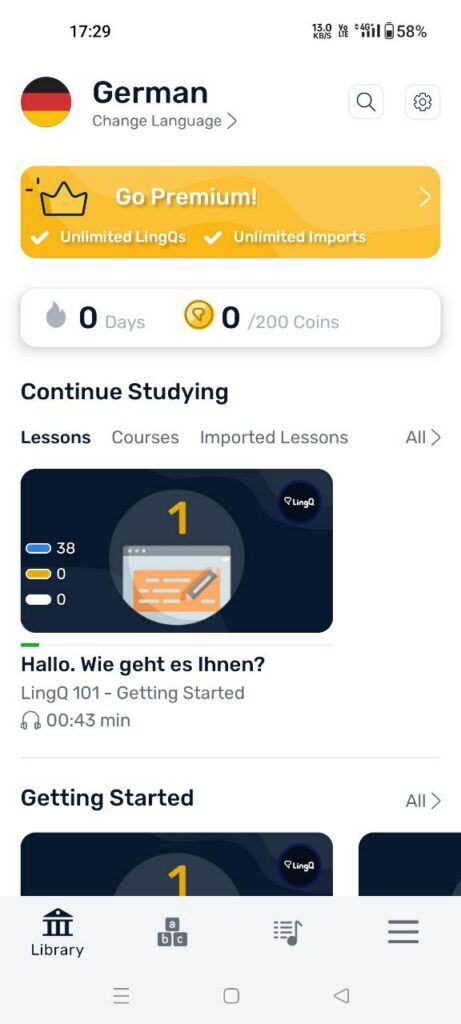
While largely positive, some minor issues are reported with the app. Despite this, the user finds LingQ to be quite engaging and particularly values the capability to import customized information for learning.
However, they discovered irregular misalignments between highlighted words and spoken material in certain films as well as sometimes differing translations and displayed phrases. They also recommend a function that would allow users to input song lyrics from Spotify for language learning.
Another user considers LingQ to be a very useful tool for attaining Portuguese fluency. They laud its efficiency in advancing their language skills more quickly than other approaches.
However, they draw attention to the fact that some of the Portuguese course’s recordings are of subpar quality. Background static and sounds of the outdoors occasionally appear in the recordings, making the learning experience unnecessarily challenging.
Memrise user Feedbacks
Numerous language lovers have given the Memrise app favorable feedback. Does Memrise teach grammar? One user passionately commends the grammar area of the software for its excellent structure, which aided their learning process.
They like the participation of native speakers in particular since it improves their practice with pronunciation and stands in striking contrast to other platforms’ synthetic sounds. The user compliments the funny tone of the immersion part and says they’d want to try the premium version even though they currently utilize the free tier.
Another user praises the app’s simplicity and emphasizes its capacity to reproduce real accents. Surprisingly, they have seen a significant development in their language abilities even with little use.
The vocabulary’s up-to-date nature and positive feedback from a native speaker partner further attest to the app’s effectiveness. They gladly declare their plan to get the complete edition in order to check out its further features.

Another reviewer points out that the program has extensive language support and offers content in many different languages. One of the better language learning programs they’ve used, thanks to the flexibility to turn off commercials and access paid material. They acknowledge the slight annoyances caused by advertisements, yet they still think the experience is worthwhile despite them. Their review shows how happy they were to find an app with so many resources.
The immersive features of the software, such the video and audio from native speakers, have proven useful for Japanese learners. When presented with fresh content, they draw attention to the need for further review questions.
Different repetition techniques may be seen when compared to Duolingo. Interestingly, an edit to the review later highlights the discovery of the “Learn” tab, offering a solution to revisiting earlier lessons.

Finally, a devoted user praises the program for helping them study German again and try out Japanese. They recognize the value of the new choices despite their nostalgia for the earlier course selection.
The learning flow was thrown off by the introduction of strange vocabulary and Japanese in the early courses, which caused some dissatisfaction for the students. Overall, their many years of enthusiastic use of the app continue to be a witness to its excellence.
Memrise vs LingQ Summary
Memrise
Total Languages: 23
Starts from: $14.99
30 Days Money Back Guarantee
What did We like?
With the help of Memrise’s interactive challenges and mnemonic devices, start off on a gamified language trip. Structured courses guide beginners through a clear learning path, while the spaced repetition system ensures vocabulary retention. Enjoy visual learning via interactions and images, which is excellent for memory retention. On-the-go practicing is simple with a user-friendly smartphone app. For language enthusiasts seeking an enjoyable, organized, and effective learning experience, Memrise delivers a stimulating atmosphere. Playfully improve your language abilities with Memrise. 🚀📱
- Gamified Learning
- Structured Courses
- Spaced Repetition System
- Audio Pronunciation
- Visual Learning
- Mobile App
- Community Features
- Less Focus on Context
- Limited Content Choice
- Less Depth in Advanced Topics
LingQ
Total Languages: 45
Starts from: $12.99
30 Days Money Back Guarantee
What did We like?
Take advantage of LingQ’s immersive, content-rich approach to language learning. Read real books, listen to real podcasts, and watch real videos to grasp language in its context. Create vocabulary lists to personalize your learning path, and discover adaptive algorithms that push you at your own speed. LingQ offers a community platform for interaction, making your language journey fascinating and real. It is best for intermediate and advanced learners. For context-driven, in-depth language learning, use LingQ. 📚🌐
- Authentic Content Immersion
- Vocabulary in Context
- Personalized Vocabulary Lists
- Adaptive Algorithms
- Community Interaction
- Multi-Language Options
- Flexibility and Autonomy
- Learning Curve
- Limited Structured Learning
- Less Emphasis on Speaking
Yes, LingQ is suitable for learners of all levels. However, its immersion-based approach might require beginners to adjust to the content-driven learning style.
Absolutely! Memrise offers courses in a variety of languages, both popular and less commonly taught ones, making it versatile for language enthusiasts.
LingQ provides statistics and goals to track your progress. You can monitor the number of words learned, lessons completed, and set daily learning targets.
Yes, Memrise’s gamified features are designed to be engaging for learners of all ages. The challenges, mnemonic techniques, and rewards appeal to a wide audience.
While LingQ might not emphasize speaking as much as other platforms, its immersion-based approach contributes to overall language skills, including comprehension, vocabulary, and understanding of natural language usage.
The choice depends on your learning style. LingQ emphasizes context-driven immersion, while Memrise offers a gamified approach with structured courses. Consider your preferences and goals.
Memrise uses interactive challenges, mnemonic techniques, and spaced repetition to help learners retain vocabulary. Structured courses guide your learning journey, making it engaging and effective.
Memrise Pro offers features like offline access, progress tracking, and additional content. It enhances your learning experience with added convenience and tools.
LingQ offers both free and premium subscription options. While some features are available for free, a premium subscription provides access to more content and tools.
A Memrise subscription provides extra features like offline learning and in-depth progress tracking. Evaluate how these benefits align with your language learning goals.
Memrise contributes to language learning but achieving fluency requires consistent practice and exposure. It’s an effective tool when used as part of a comprehensive learning strategy.
Memrise focuses more on vocabulary and conversational skills. While it might touch on grammar through context, it doesn’t provide as comprehensive grammar instruction as dedicated resources.
LingQ can greatly enhance your language skills through immersion and context. While it’s a powerful tool, fluency requires practice, exposure, and a well-rounded language learning approach.
You get access to all 23 languages with more in-depth content with lifetime access.

Meet Bill, a French language teacher and blogger who specializes in testing various language learning apps. He has been teaching French for nearly 4 decades and holds a Bachelor’s degree from Manhattanville College. With a passion for technology and how it can enhance language learning, Bill has spent years testing and reviewing different language learning platforms. His blog provides valuable insights into the pros and cons of each app, as well as tips for language learners of all levels.
